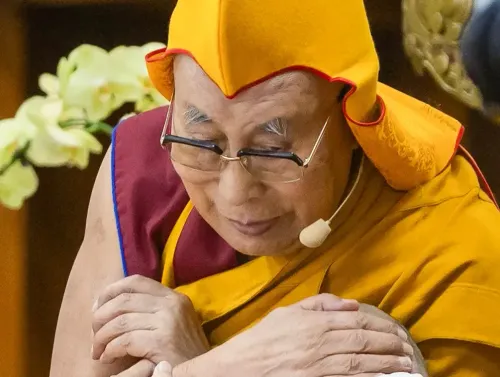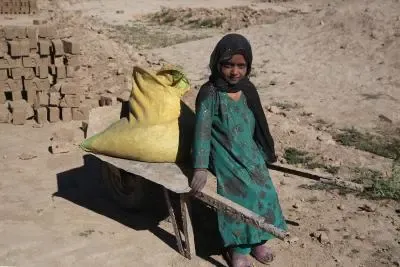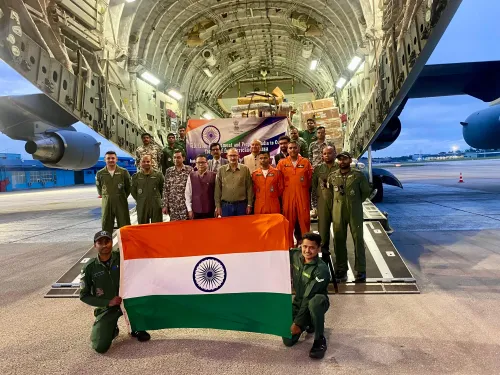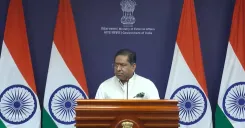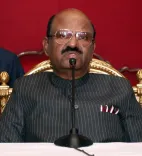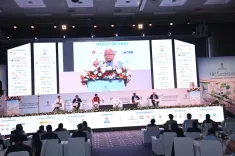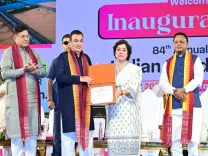China and India Must Emphasize Development and Collaboration: Beijing
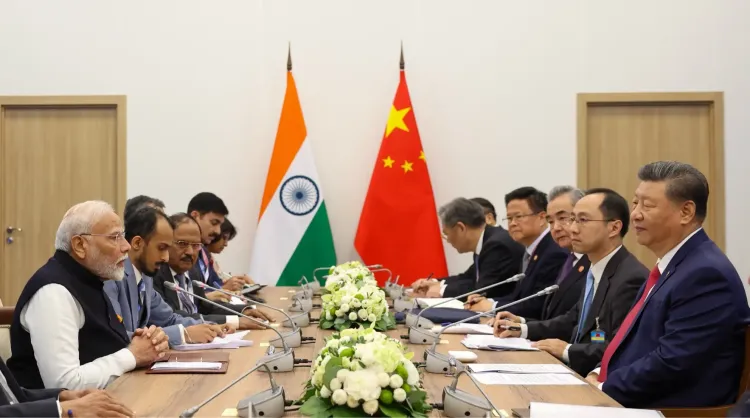
Synopsis
Key Takeaways
- China and India should focus on development and cooperation.
- Both nations have over 2.8 billion people relying on a stable relationship.
- Importance of long-term strategic perspectives in bilateral relations.
- Advocacy for genuine multilateralism and a multipolar world.
- Recognition of each other as opportunities for development rather than competitors.
Beijing, Jan 21 (NationPress) As two significant developing nations and emerging economies, China and India should prioritize development and cooperation to restore their bilateral relationship to a path of healthy and stable growth, stated Guo Jiakun, spokesperson for the Chinese Foreign Ministry, on Tuesday.
These comments were made during a daily press briefing in response to Indian Foreign Minister S. Jaishankar's recent address, where he emphasized that India-China relations are critically tied to the development prospects of both nations and the international order, asserting that India will manage its relationship with China from a long-term perspective.
“As two ancient civilizations, developing countries, and emerging economies, China and India must concentrate on development and foster cooperation. This approach benefits the fundamental interests of over 2.8 billion people in both nations, aligns with the collective aspirations of regional countries and peoples, resonates with the historical trend of the Global South's enhancement, and contributes to the peace and prosperity of both the region and the global landscape,” Guo stated.
The spokesperson further emphasized the necessity for both sides to earnestly fulfill the significant common understandings established between Chinese President Xi Jinping and Prime Minister Narendra Modi during their meeting in Kazan. This includes recognizing that China and India represent each other's development opportunities rather than threats, and should act as partners in cooperation instead of competitors.
“We must approach and manage bilateral relations from a strategic and long-term viewpoint, steering the relationship back towards healthy and stable growth while identifying the correct pathway for large neighboring nations to coexist harmoniously and develop together.
In the realm of global affairs, both nations need to uphold the Five Principles of Peaceful Coexistence, embrace genuine multilateralism, advocate for a fair and orderly multipolar world, and promote universally beneficial and inclusive economic globalization, thereby making a more significant contribution to world peace, stability, development, and prosperity,” Guo remarked.
On January 18, while delivering remarks at the Nani Palkhivala Memorial Lecture titled ‘India and the World’, EAM Jaishankar pointed out the unique challenge India faces in establishing equilibrium with China even as most of its other relationships progress.
Much of this challenge arises from the simultaneous rise of both nations.
“As immediate neighbors and the only two societies with populations exceeding one billion, their dynamic was never straightforward. It has been further complicated by a boundary dispute, historical baggage, and differing socio-political systems. Misinterpretations by previous policymakers, driven by idealism or a lack of realpolitik, have hindered both cooperation and competition with China. This situation has notably evolved over the past decade,” Jaishankar noted.
He remarked that currently, the relationship is attempting to “unravel” the complications stemming from the post-2020 border situation.
“While that issue is being addressed, more contemplation is essential regarding the long-term evolution of ties. Clearly, India must be prepared for manifestations of China’s growing capabilities, especially those impacting our interests. A more accelerated development of India’s comprehensive national power is imperative to uphold its position,” the EAM stated.
“This endeavor involves not only rectifying the previous disregard for border infrastructure and maritime periphery but also reducing reliance in sensitive areas. Practical cooperation could occur with appropriate diligence. Overall, India's strategy can be encapsulated in the three mutuals: mutual respect, mutual sensitivity, and mutual interests. Bilateral relations can also benefit from a heightened awareness that the stakes include the broader prospects of both nations and, indeed, the global order. Acceptance of the emergence of a multipolar Asia is a critical prerequisite for a multipolar world,” he elaborated.

